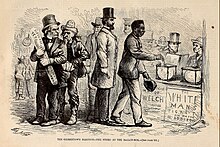
Wikipedia
The Evolution of Voting Rights Legislation in the United States
Background and Overview
Voting rights have been a contentious issue throughout American history. In recent years, there has been a renewed focus on expanding voting access and strengthening election integrity. Several bills have been introduced in Congress to address these concerns, including the Freedom to Vote Act, the Uniformed and Overseas Citizens Absentee Voting Act, and the Lewis Voting Rights Advancement Act.
The Freedom to Vote Act
The Freedom to Vote Act (FTVA) is a comprehensive voting rights bill that was introduced in 2021. The bill aims to expand voting access, change campaign finance laws, and strengthen election security. Key provisions of the FTVA include: * Establishing a national standard for automatic voter registration * Expanding early voting and mail-in voting * Making Election Day a federal holiday * Reforming campaign finance laws to reduce the influence of corporate donations
The Uniformed and Overseas Citizens Absentee Voting Act
The Uniformed and Overseas Citizens Absentee Voting Act (UOCAVA) was enacted in 1986 to consolidate and recodify the Overseas Citizens Voting Rights Act and the Federal Voting Assistance Act. UOCAVA ensures that members of the uniformed services and overseas citizens have the right to vote in federal elections.
The Lewis Voting Rights Advancement Act
The Lewis Voting Rights Advancement Act was proposed in 2023 and is named after civil rights activist John Lewis. The bill seeks to restore and strengthen provisions of the Voting Rights Act of 1965 that were weakened by the Supreme Court's 2013 decision in
Shelby County v. Holder. Key provisions of the Lewis Voting Rights Advancement Act include: * Requiring certain states with a history of voter discrimination to obtain federal approval for changes to their election laws * Restoring the ability of federal courts to block discriminatory voting laws * Expanding early voting and automatic voter registration in these states

Wikipedia


Comments